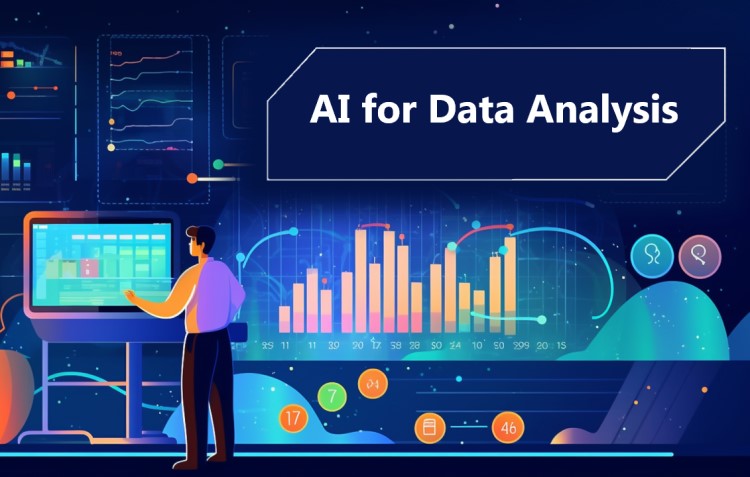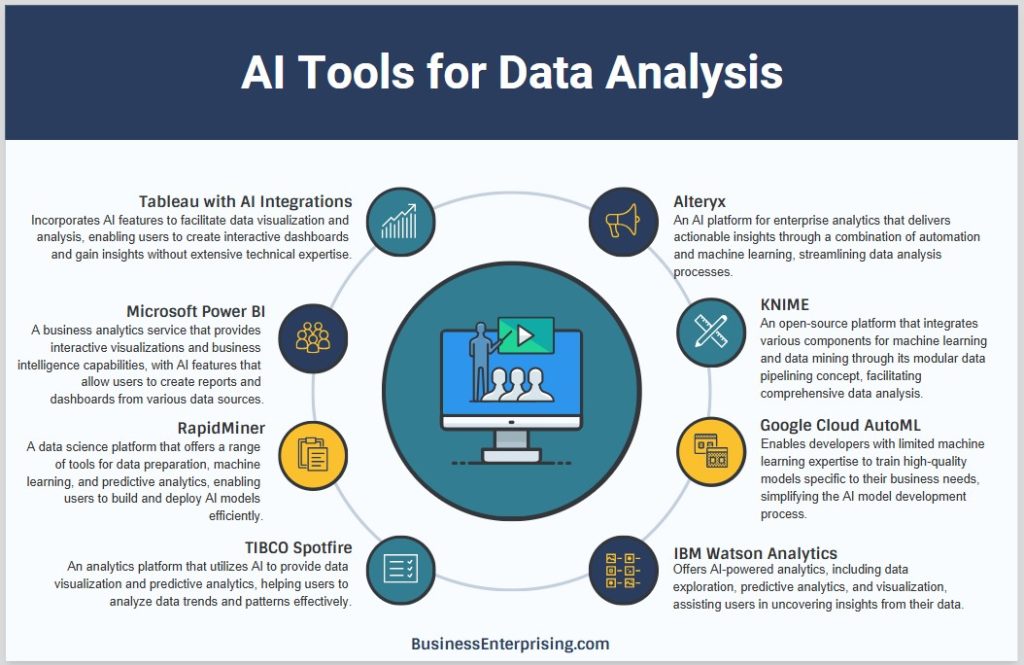 AI for data analysis is transforming how businesses process information and make decisions. Traditional methods often struggle with the scale and complexity of modern data. However, AI streamlines these processes by automating tasks and uncovering hidden patterns. This shift allows you to gain insights faster and more accurately.
AI for data analysis is transforming how businesses process information and make decisions. Traditional methods often struggle with the scale and complexity of modern data. However, AI streamlines these processes by automating tasks and uncovering hidden patterns. This shift allows you to gain insights faster and more accurately.
Additionally, AI adapts to various industries, from retail to healthcare, offering tailored solutions for specific challenges. Predictive modeling, customer segmentation, and fraud detection are just a few examples of its impact. As these applications grow, more businesses are recognizing the value of integrating AI into their workflows.
By understanding the potential of AI for data analysis, you can position your business to stay competitive. Leveraging these tools helps you turn raw data into actionable strategies, driving innovation and growth. This guide explores the opportunities and challenges of adopting AI, equipping you with the knowledge to make informed decisions.
Understanding AI in Data Analysis
AI for data analysis has transformed how businesses interpret and use information. Traditional methods often require significant time and manual effort. However, AI enhances these processes by automating data collection, organization, and interpretation. Additionally, it enables faster analysis and uncovers patterns that might otherwise go unnoticed.
Machine learning plays a key role in advancing data analytics. These algorithms learn from data, improving accuracy over time. For example, supervised learning models can predict trends based on historical data, while unsupervised learning identifies hidden relationships. Furthermore, deep learning techniques allow AI to process complex datasets, such as images or unstructured text.
By integrating AI-driven algorithms, you gain actionable insights with greater efficiency. Additionally, AI tools adapt to changing data, making them reliable for dynamic industries. Whether forecasting sales or identifying anomalies, AI for data analysis delivers meaningful results. Understanding these capabilities allows you to leverage AI effectively, making your decision-making process smarter and faster.
Applications of AI in Data Analysis
AI for data analysis has become an essential tool across industries, delivering powerful use cases that transform decision-making. Predictive modeling is widely used to forecast future trends and outcomes. For example, AI helps retailers predict inventory needs based on customer buying patterns. Additionally, in healthcare, predictive models assist in diagnosing diseases earlier, improving patient outcomes.
Customer segmentation is another area where AI provides significant value. Businesses can analyze customer behavior and preferences to create personalized marketing campaigns. For instance, e-commerce companies use AI to recommend products tailored to individual users, increasing engagement and sales. Furthermore, segmentation helps businesses identify high-value customers and prioritize retention efforts.
Fraud detection highlights the critical role of AI in financial services. By analyzing transaction data, AI systems identify anomalies that may indicate fraudulent activities. For example, banks use real-time algorithms to flag unusual credit card charges. Additionally, insurance companies leverage AI to detect false claims, reducing operational losses. These applications demonstrate how AI for data analysis enhances efficiency and security across sectors.
Real-world examples highlight the transformative power of AI. Companies like Amazon use AI for demand forecasting and personalized recommendations. Similarly, healthcare providers employ AI to streamline patient care and improve diagnostics. These applications showcase how adopting AI solutions drives innovation and delivers actionable insights for businesses.
Key Benefits of AI in Data Analysis
AI for data analysis offers significant benefits, making it a valuable tool for businesses managing large datasets. Traditional methods often struggle with the volume and complexity of data, but AI processes information quickly and efficiently. Additionally, AI systems can analyze data in real-time, enabling faster decision-making. These capabilities are particularly valuable for industries like finance and retail, where timely insights are critical.
Another key advantage is improved accuracy and the ability to uncover hidden patterns. AI algorithms reduce human error and identify correlations that might otherwise go unnoticed. For example, AI can reveal purchasing trends or detect subtle shifts in customer behavior. Furthermore, these insights allow businesses to make more informed decisions and create targeted strategies. This level of precision strengthens your ability to compete in dynamic markets.
Cost and time efficiency are also important benefits of using AI for data analysis. Automating repetitive tasks reduces the need for manual labor, saving both time and resources. Additionally, AI solutions often provide long-term savings by streamlining workflows and improving operational efficiency. These advantages not only support business growth but also enhance your overall return on investment. By leveraging AI, you gain the tools needed to stay competitive and agile in a data-driven world.
AI Tools and Platforms for Data Analysis
AI for data analysis relies on powerful tools and platforms to deliver actionable insights and streamline workflows. TensorFlow is widely used for developing machine learning models, offering flexibility for a variety of applications. Additionally, platforms like Tableau now include AI integrations, enabling you to create visualizations and predictions from your data effortlessly. IBM Watson Analytics simplifies data exploration with natural language processing, making complex analytics accessible even to non-technical users.
Choosing the right tools depends on your business needs and goals. If your focus is on building custom AI models, TensorFlow offers extensive capabilities and scalability. However, for businesses looking to enhance data visualization and insights, Tableau’s AI-powered features are ideal. Additionally, IBM Watson Analytics works well for organizations prioritizing ease of use and automated insights. Understanding your requirements and available resources helps you select the platform that delivers the best value.
By leveraging the right AI tools for data analysis, you can maximize efficiency and decision-making capabilities. Consider factors like budget, technical expertise, and integration needs when making your selection. Additionally, staying updated on advancements ensures your tools remain relevant and effective. With the right platform, you can harness AI to transform your data into meaningful business strategies.
Challenges and Limitations of AI in Data Analysis
AI for data analysis presents significant opportunities, but it also comes with challenges and limitations. Data quality issues are among the most common obstacles. Incomplete or inaccurate data can lead to unreliable insights and flawed decisions. Additionally, biases in the training data can impact AI models, causing unfair or misleading outcomes. These biases often reflect systemic patterns in the data, which can perpetuate inequalities if left unaddressed.
Ethical concerns also play a critical role in the use of AI for data analysis. Privacy is a major consideration, as analyzing sensitive data requires strict adherence to regulations like GDPR or CCPA. Furthermore, ensuring transparency in AI processes is essential for building trust. When users cannot understand how decisions are made, they may hesitate to adopt AI solutions fully.
Strategies to address these challenges focus on improving data quality and ethical practices. Regularly cleaning and validating your data ensures its accuracy and relevance. Additionally, incorporating diverse datasets reduces biases and enhances the fairness of AI models. To tackle ethical concerns, prioritize explainable AI tools that provide clear insights into their decision-making processes. Regular audits and compliance checks further ensure that your AI applications align with industry standards and best practices.
By proactively addressing these challenges, you can maximize the potential of AI for data analysis while minimizing risks. Building trust and ensuring ethical use strengthens the reliability of your insights. These efforts not only improve your results but also enhance the long-term value of your AI investments.
The Future of AI in Data Analysis
The future of AI for data analysis holds exciting possibilities, driven by emerging trends and innovations. Explainable AI (XAI) is gaining traction as businesses demand transparency in AI-driven decisions. XAI focuses on making AI processes understandable and interpretable, helping you trust and act on insights confidently. Additionally, this trend supports compliance with ethical standards and builds user confidence in AI systems.
Automated data storytelling is another trend reshaping how insights are communicated. AI now translates complex data into clear narratives that are easy to understand. These tools allow you to share actionable insights with stakeholders more effectively. Additionally, automated storytelling saves time and reduces the need for manual analysis, making decision-making faster and more efficient.
Looking ahead, AI is poised to become even more integral to data-driven strategies. Predictive analytics will evolve, offering deeper foresight into market trends and consumer behavior. Additionally, advancements in AI will improve real-time decision-making, enabling businesses to respond to changes immediately. As AI tools become more accessible, their adoption will continue to grow across industries.
By staying informed about these trends, you position your business to capitalize on the future of AI for data analysis. Embracing these advancements enhances your ability to uncover meaningful insights and adapt to changing demands. These developments promise to make data analysis more intuitive, reliable, and impactful than ever before.
Conclusion
AI for data analysis has revolutionized how businesses process information, uncover insights, and make decisions. By automating tasks and improving accuracy, AI transforms data into actionable strategies. Additionally, advancements like explainable AI and automated data storytelling continue to reshape the landscape of analytics.
However, challenges like data quality, bias, and ethical concerns must be addressed to maximize the potential of AI. Adopting reliable tools and strategies ensures you achieve consistent and trustworthy results. Furthermore, staying informed about emerging trends allows you to leverage AI effectively in a rapidly changing environment.
By embracing AI for data analysis, you equip your business with the tools needed to stay competitive and adaptable. This approach not only enhances efficiency but also drives innovation and growth. With the right strategies and tools, you can unlock the full potential of AI to transform your data into meaningful outcomes.



